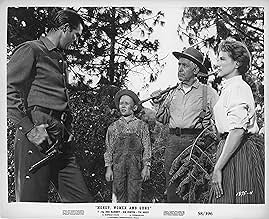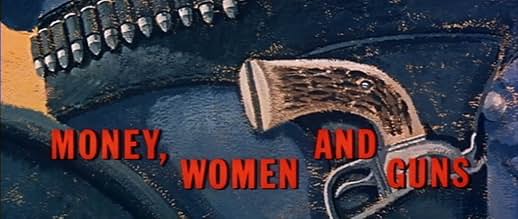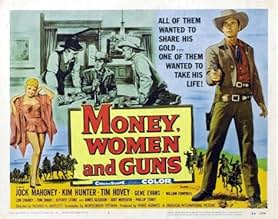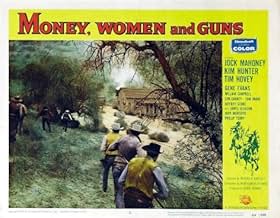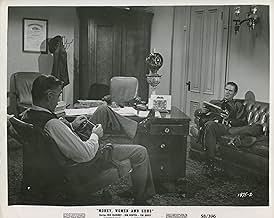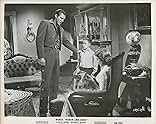PUNTUACIÓN EN IMDb
6,2/10
452
TU PUNTUACIÓN
Después de que un buscador de oro sea asesinado por ladrones enmascarados, un detective es contratado para encontrar al asesino superviviente, así como a los herederos legales del buscador.Después de que un buscador de oro sea asesinado por ladrones enmascarados, un detective es contratado para encontrar al asesino superviviente, así como a los herederos legales del buscador.Después de que un buscador de oro sea asesinado por ladrones enmascarados, un detective es contratado para encontrar al asesino superviviente, así como a los herederos legales del buscador.
Lon Chaney Jr.
- Art Birdwell
- (as Lon Chaney)
Judi Meredith
- Sally Gunston
- (as Judy Meredith)
Rodney Bell
- Martin
- (sin acreditar)
Jack Daly
- Livery Stable Man
- (sin acreditar)
Steve Darrell
- Sheriff Madsen
- (sin acreditar)
Franklyn Farnum
- Postmaster
- (sin acreditar)
Reseñas destacadas
This would have been a "prestige" western at the time, in color and Cinemascope, with recognizable stars. It keeps your interest despite the many broken promises.
First of all, the Cinemascope lens was plopped down on soundstages, wasting the panorama. The title is misleading. "Money" figures in the plot, granted. But I counted only two "Women." Neither projected the woman in the lobby poster (a soiled dove stripped down to her skivvies), being, instead, hardy frontier stock. And "Guns" suggests action that never really materializes.
Jock Mahoney was a legendary stuntman. He was pushing 40 by the time of this production, but still had a couple Tarzan roles in his future. You can see effortless grace in his movement, apparently weightless. Horseback, Mahoney appears to glide across the prairie hovering above his pounding steed. Mahoney's fight choreography was unsurpassed until the Hong Kong kung fu school a generation later. The script and direction simply declined to tap the resource. The fashion in westerns by the late '50s had shifted from action to the talk-burdened, angsty "psychological western."
In the early '50s there was a glut of syndicated half-hour westerns to fill the maw of local programming until networks could supply their own content. These were unabashed orgies of fistfight, shoot-out and horseplay (I mean on horses), with surprising amounts of plot - and absolutely no suspense: the hero brought the bad guy to justice. Within their formula, these actioners were brilliant catalogs of stunt work. They far surpassed the action scenes in big budget big screen productions. (John Wayne, just for example, was a lousy stage fighter. He had this big roundhouse right that took forever to land. Hey, bad guy! Move out of the way! Duck and land a couple uppercuts before that punch completes its orbit!)
Jock Mahoney as "The Range Rider" was hands-down the greatest of the syndicated cowboys. Simply mounting and dismounting were done with gymnastic flourish - even holstering his gun. No runaway stage went unboarded. No picket fence went unhurdled. No stick of furniture in a brawl went unsmashed. No monolithic boulder went unjumped up on or down from. These shows were the bridge between the astonishing physicality of the silent movie comedians and the flying fists of the chop-saki masters.
By the late '50s, oaters dominated network primetime. They strove to stand out from each other by issuing odd weaponry, or creating weird hybrids: the urbane western, the spy western, the jazz western. (Nobody thought to bring back the singing cowboy.)
"Money, Women and Guns" feels a lot like a pilot for a TV series. The story plays out episodically as our hero tracks down suspects in the murder of a rich old prospector. The suspects are also the beneficiaries of his will. We learn how the suspects were associated with the dead man. (Sort of a sagebrush "Citizen Kane".) Mahoney plays "Silver" Ward Hogan, a self-described "detective", not a bounty hunter or territorial marshal. Indeed, Hogan owes as much to Joe Friday as the Lone Ranger. The story is carried by the mystery. It also has some of the quality of "Law & Order" in that the first character suspected is never the murderer-unless, of course, the investigation circles back to him. I'm not saying it does or doesn't.
This film is very unexpected. Almost from the beginning it just does not seem like a western and it really is not. It's a first rate drama that just happens to have a western setting. There's no gun shooting, no chases, no brawls - but there is serious dialogue that grips you immediately. The story is also very unusual, hardly the kind of matinée western Universal was famous for. But through all of it Jock Mahoney is absolutely luminous he is so handsome, dashing, and sexy. You just cannot take your eyes off him. Kim Hunter, the woman Jock falls for is a perfect foil for him. He is interested right away but the idea of settling down is more than he can take. What happens and how it happens is a delightful surprise.
1958's "Money, Women and Guns" was a somewhat modest color B-Western from Universal, where Jock Mahoney was coming off his one science fiction title, "The Land Unknown." Elderly prospector Ben Merriweather (Edwin Jerome) is bushwhacked by a trio of masked marauders, two of which are killed in a brief shootout. In his final moments, the dying man writes out his last will and testament, leaving his wealth to a half dozen beneficiaries, and it's up to Mahoney's frontier detective 'Silver' Ward Hogan to track each one down. One is played by William Campbell, an ex-con struggling to go straight alongside young wife Judi Meredith (both worked for Roger Corman in 1966, Campbell in "Track of the Vampire" and Meredith in "Planet of Blood"). The youngest is David Kingman (Tim Hovey), a little boy whose only contact with Merriweather was a conversation about Santa Claus; his widowed mother (Kim Hunter) takes a shine to the wandering loner that David worships. One self contained vignette teams James Gleason's Henry Devers with Lon Chaney's Art Birdwell; Devers was Merriweather's former prospecting partner, who sends his poker playing partner Birdwell into town to cash his $50,000 beneficiary check. Jeffrey Stone followed up with "The Thing That Couldn't Die," while Phillip Terry did "The Leech Woman" (Tom Drake worked with Chaney in 1956's "The Cyclops" and 1966's "House of the Black Death"). As for Chaney, this innocuous little Western marked his final credit for Universal, the studio that cast him adrift following 1945's "House of Dracula," calling him back on only four occasions, the first three being 1948's "Abbott and Costello Meet Frankenstein," 1951's "Flame of Araby," and 1952's "The Black Castle" (he previously worked for director Richard H. Bartlett in 1955's "The Silver Star," for Lippert Pictures).
A prospector has been murdered. He has left a will splitting a quarter of a million dollars among five heirs. The problem is no one is sure who they are. Detective Jock Mahoney is assigned to track them down, and to figure out why the dead man chose them.
Maohoneyis rather stiff in his line readings, and his outfit looks odd, all velveteen and bright silver buttons for riding the range. Even so, it's an interesting Shaky A western from Universal, not only for the figuring out of the why of the mystery, but for some casting, including Kim Hunter, and James Gleason in his last screen role.
Maohoneyis rather stiff in his line readings, and his outfit looks odd, all velveteen and bright silver buttons for riding the range. Even so, it's an interesting Shaky A western from Universal, not only for the figuring out of the why of the mystery, but for some casting, including Kim Hunter, and James Gleason in his last screen role.
This was a fair western but Jock and Tim Hovey worked well together. He finally got his chance to show his stuff. Actually, my mom's favorite western was "Slim Carter" about a man changing his ways over a kid. Mr. Mahoney was in a lot of movies but for a long time you never saw his face, just his riding skill on a white horse. Eventually he was shown as a Texas Ranger chasing the Durango Kid over rooftops and finally jumping off a roof onto the white horse. Part of the time Jock was literally chasing himself. My favorite DK series was "Bandits of El Dorado". There were so many well known names..John Dehner,Fred Sears, Lewis, and of course...Clayton Moore, whose voice I recognized instantly as the future Lone Ranger. In the movie of this subject, Jock looked like a powerful man, large shoulders small waist, and could ride a horse like he was part of it. Thanks for letting me share.
¿Sabías que...?
- CuriosidadesLon Chaney Jr's last film for "Universal."
- PifiasIn an early scene, if you keep an eye on Ben Merriweather as he scrawls out his dying note, there's no way his erratic, shaking hand could have produced anything legible.
- Banda sonoraLonely Is The Hunter
Composed and Sung by Jimmy Wakely
Selecciones populares
Inicia sesión para calificar y añadir a tu lista para recibir recomendaciones personalizadas
Detalles
- Fecha de lanzamiento
- País de origen
- Idioma
- Títulos en diferentes países
- Money, Women and Guns
- Localizaciones del rodaje
- Empresa productora
- Ver más compañías en los créditos en IMDbPro
- Duración
- 1h 20min(80 min)
- Relación de aspecto
- 2.35 : 1
Contribuir a esta página
Sugerir un cambio o añadir el contenido que falta


